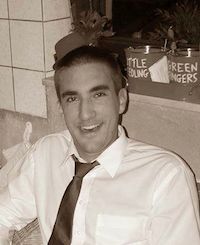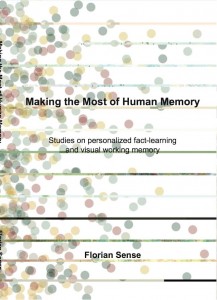 Heijmans Institute
Heijmans Institute
Faculty of Behavioural and Social Sciences
University of Groningen
Supervisors
Prof. D.H. van Rijn & Prof. R.R. Meijer
On April 20th, 2017, Florian Sense defended his thesis entitled
Making the most of human memory
Studies on personalized fact-learning and visual working memory
 Summary
Summary
Rote learning of facts is boring. Here, we present a way to make it more efficient so facts are learned faster. Learners usually need to repeat facts multiple times to learn them well. The optimal timing of these repetitions depends on the facts that are studied and the characteristics of the learner. Learning software that takes such differences into account is called adaptive. Here, we show that the adaptive system developed in our lab outperforms a flashcard system often utilized by students: on average, students learn more and make fewer errors during learning if they use the adaptive system. This improvement is possible because the system simulates a very simplified version of each learner’s memory and can predict when individual facts are forgotten. We show that parameters estimated during learning can predict test performance but are not related to intelligence or working memory capacity (in the tested sample). We also demonstrate that the parameters estimated for one learner are stable over time but differ slightly over materials. Finally, future developments and improvements of the system are discussed. For example, the adaptive system’s capabilities should be extended to multi-session learning. Gaining access to large amounts of data collected in realistic (educational) settings will be the key to these developments. Collaborations with Noordhoff and HoeGekIsNL? and a RUG-funded project called Rugged Learning will provide such data and will enable us to verify and test additional assumptions that should further improve the system.
Project
Optimizing Learning by Hierarchical Bayesian Estimation of Individuals’ Learning Parameters
Computer-based learning has become a viable option for many classrooms. Ideally, such software will provide the optimal structure to acquire the desired skill. In optimal fact learning, the time between repetitions of an item should be maximized while ensuring that the student can still retrieve them from memory. Thus, the spacing and the testing effect need to be balanced. Taking individual differences into account, one would want to estimate a range of parameters based on students’ input: the difficulty of an item, the activation of that item in a student’s memory, and how fast each student tends to forget each item. Mathematically, hierarchical Bayesian modeling provides the perfect framework for updating probability distributions of parameters in real-time and thus optimize the scheduling of study items. Using this approach, we can evaluate the benefits of this type of optimization by contrasting it to existing, simpler methods of parameter optimization in individualized learning support systems such as lists, flash cards, or systems that do not take individual difference into account.
Financed by
NWO
